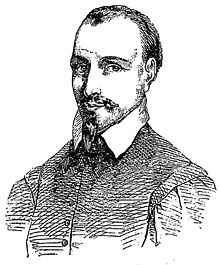Olivier de Serres: Difference between revisions
Citation bot (talk | contribs) Added title. Changed bare reference to CS1/2. | Use this bot. Report bugs. | Suggested by Dominic3203 | [[Category:Agriculture stubs] | #UCB_Category 435/584 |
Eburg Editor (talk | contribs) m crop rotation is not the same as crop diversity |
||
| Line 27: | Line 27: | ||
Serres was born in 1539 at [[Villeneuve-de-Berg]], [[Ardèche]]. His brother, [[Jean de Serres]], was a well-known French humanist and translated the complete works of [[Plato]]. |
Serres was born in 1539 at [[Villeneuve-de-Berg]], [[Ardèche]]. His brother, [[Jean de Serres]], was a well-known French humanist and translated the complete works of [[Plato]]. |
||
His book was notable for recommending winegrowers to plant 5 to 6 varieties in their vineyards to balance the risk of a crop failing, an |
His book was notable for recommending winegrowers to plant 5 to 6 varieties in their vineyards to balance the risk of a crop failing, an example of [[crop diversity]]. |
||
It also recommended ''[[métayage]]'' ([[sharecropping]]) so that cash tenants would take all the risks and thus demand lower rent, as hired labour is expensive to manage. Sharecroppers administer themselves and risks are divided with the landlord. According to him, only large landowners should take the risk of hiring labourers and running the estate themselves.<ref>The Economic Theory of Sharecropping in Early Modern France, Philip Hoffman, The Journal of Economic History 1984, page 312</ref> |
It also recommended ''[[métayage]]'' ([[sharecropping]]) so that cash tenants would take all the risks and thus demand lower rent, as hired labour is expensive to manage. Sharecroppers administer themselves and risks are divided with the landlord. According to him, only large landowners should take the risk of hiring labourers and running the estate themselves.<ref>The Economic Theory of Sharecropping in Early Modern France, Philip Hoffman, The Journal of Economic History 1984, page 312</ref> |
||
Revision as of 12:30, 15 August 2024
Olivier de Serres | |
|---|---|
 | |
| Born | 1539 |
| Died | 1619 (aged 79–80) |
| Nationality | French |
| Occupation(s) | author, soil scientist |
| Known for | accepted textbook of French agriculture in the 17th century |
| Notable work | Théâtre d'Agriculture (book) |
| Relatives | Jean de Serres (brother) |
Olivier de Serres (French pronunciation: [ɔlivje də sɛʁ]; 1539–1619) was a French author and soil scientist whose Théâtre d'Agriculture (1600) was the accepted textbook of French agriculture in the 17th century.[1]
Biography
Serres was born in 1539 at Villeneuve-de-Berg, Ardèche. His brother, Jean de Serres, was a well-known French humanist and translated the complete works of Plato.
His book was notable for recommending winegrowers to plant 5 to 6 varieties in their vineyards to balance the risk of a crop failing, an example of crop diversity.
It also recommended métayage (sharecropping) so that cash tenants would take all the risks and thus demand lower rent, as hired labour is expensive to manage. Sharecroppers administer themselves and risks are divided with the landlord. According to him, only large landowners should take the risk of hiring labourers and running the estate themselves.[2]
Domaine Olivier de Serres
The Domaine Olivier de Serres is Olivier de Serres' former estate, located in Ardèche. It hosts facilities for visitors and agricultural research and teaching facilities, including some operated by Grenoble Alpes University.[3]
See also

Notes
- ^ Hugh Johnson, Vintage: The Story of Wine pg 122. Simon and Schuster 1989
- ^ The Economic Theory of Sharecropping in Early Modern France, Philip Hoffman, The Journal of Economic History 1984, page 312
- ^ "Cermosem : IUGA's rural campus".
External links
